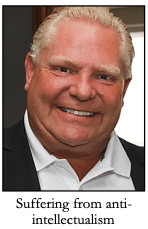
New Conservative chief, Erin O’Toole, has recently been singing a popular populist tune. He is greatly concerned about the “elites.”
“These elites have only one set of values centred on unchecked globalization [and] political correctness,” Mr. O’Toole argues. Opposed are middle-class Canadians whose values are “rooted in family, home and nation.” The latter have been “betrayed” by “political elites, financial elites [and] cultural elites,” he insists.
Premier Ford of Ontario has also been bedevilled by elites although, like many conservatives, he is often vague in identifying the enemy. When asked just who the elites are, he offered, “They just think they’re better, they’re smarter, and they can tell the common folk how to live their lives. And they drink their little bottle or glass of champagne with their pinky up in the air.”
Ford’s definition is reminiscent of the reaction of Republican Senator Ted Cruz when the environmental inefficiency of meat as a source of protein was being discussed in the media. “Now they’re trying to take away our hamburgers,” lamented the good senator. Actually no one was trying to deprive Ted of his hamburgers. It was simply a matter of scientists doing the research and presenting some facts that a leader like Cruz might apply to the public good. Instead, he chooses to feel persecuted, to feel picked upon. His response tells us something about conservatives’ concern about elites.
The elites include those who did the research on meat, i.e. scientists. These are the people that Ford and Cruz believe are telling common folk how to live their lives. Actually they are simply presenting facts, but facts that conservatives often don’t like to hear. Facts that tell us, for instance, that we are despoiling our planet. Facts that tell us that if we don’t want to see civilization collapse around our ears we are going to have to make some serious changes, such as eating less meat and not burning fossil fuels.
The left often does a little elite-bashing, too, of course. But they tend to focus on the most powerful elite, the one that conservatives are very comfortable with—the rich.
Indeed, the elite O’Toole and Ford are very comfortable with. Ford comes from a wealthy family and O’Toole is a corporate lawyer, and you can’t get much more elite than that.
Conservatives tend to focus their disapproval on those elites immersed in knowledge, at least knowledge associated with pursuits other than economic gain. They suffer from anti-intellectualism, sometimes described as “resentment of the life of the mind, and those who are considered to represent it.” We saw this illustrated perfectly by the Stephen Harper government’s antipathy toward science.
There is lots of political hay in elite-bashing, so we can appreciate the conservatives’ interest. According to a CBC poll almost 80 percent of Canadians say they believe that the country is divided between “ordinary people” and “elites.”
But as tempting as it is politically, never has there been a time when we can less afford it. Never have we faced a greater threat, and never have we needed science more to deal with it. Yet conservatives have taken particular umbrage against climate science and environmentalism generally. U.S. President Trump claimed global warming was a “Chinese hoax” and has worked diligently to undermine any efforts to confront it. The Conservative’s climate platform in the last federal election was a joke. And here in Alberta our conservative premier clings desperately to the past and the glories of oil.
There is never a time for anti-intellectualism, and certainly not now. Until conservatives become conversant with science, particularly climate science, they will not be fit to govern.
It’s a plot by those damned scientists with their fancy five-figure incomes. Elite bastards.